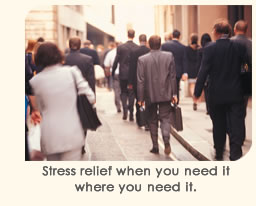
 Australia and New Zealand
Australia and New Zealand |
 Australia and New Zealand Australia and New Zealand |
|

|
|
 |
|
About Stress and the Health Effects of Stress
Definition of stress? Stress is a term used to describe the wear and tear the body experiences in reaction to everyday tensions and pressures. Change, illness, injury or career and lifestyle changes, are common causes of stress, however, it's the effects of stress, like pressure and tension, that we feel in response to the little everyday hassles—like rush hour traffic, waiting in line, and too many emails—that do the most damage. Stress is the body and mind's response to any pressure that disrupts its normal balance. It occurs when our perception of events doesn't meet our expectations and we are unable to manage our reaction. As a response, stress expresses itself as resistance, tension, strain or frustration that throws off our physiological and psychological equilibrium, keeping us out of sync. If our equilibrium is disturbed for long, the stress can become disabling and create numerous health problems. Stress and the effects of stress are often misunderstood. We look at outside events as the source of stress, but in fact stress is really caused by our emotional reactions to events. The stress we experience in today's world often goes unnoticed and unmanaged. Many people have simply adapted to stress in an unhealthy way, resigned to thinking it's “just the way it is”. Unfortunately, lack of stress management has created a pandemic of low-grade anxiety and depression. Health Effects of Stress?The effects of stress in people are seen physically, mentally and emotionally. According to the American Institute of Stress, up to 90% of all health problems are related to stress. Too much stress can contribute to and agitate many health problems including heart disease, high blood pressure, stroke, depression and sleep disorders. Additional studies confirm the debilitating effects of stress on our health:
How to relieve stress?In order to effectively relieve stress it's important to understand it's not the external events or situations that do the harm; it's how you respond to those stressful events. More precisely, it's how you feel about them that determine whether you feel the negative effects of stress and ultimately relieve stress. Emotions, or feelings, have a powerful impact on the human body. Emotions like frustration, insecurity and depressing feelings are stressful and inhibit optimal health and relief from stress. Positive emotions like appreciation, care, and love not only feel good, they promote health, performance and well-being. HeartMath's research has shown when you learn how to intentionally shift to a positive emotion, heart rhythms immediately change. A shift in heart rhythms may not seem important but in fact it creates a favorable cascade of neural, hormonal and biochemical events that benefit the entire body. The stress relief effects are both immediate and long lasting. emWave™ Personal Stress Reliever™ is designed to help you learn how to change your emotional state and heart rhythms to reduce stress levels and revitalize your entire body. |
|
| What causes stress? Find out | The science behind emWave | Learn how emWave works! | ||||
Find out where stress comes from |
Did you know that the emWave is |
|||||
|